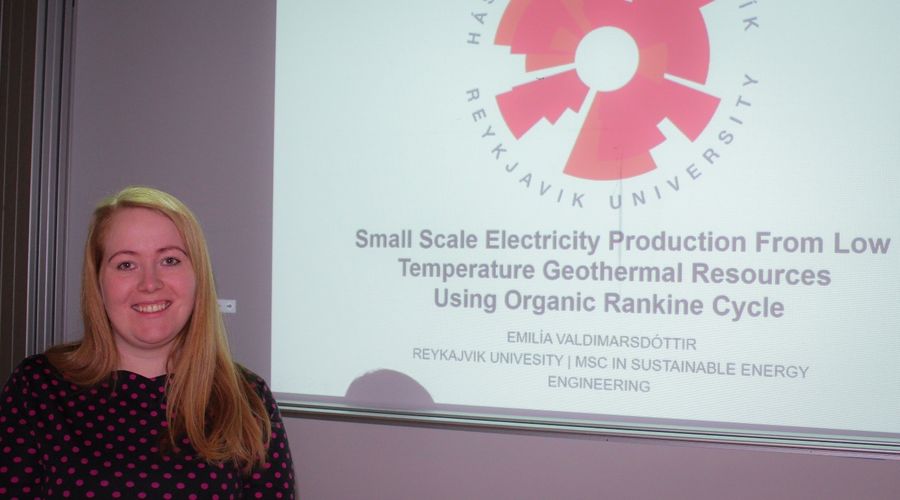MSc Thesis: Small Scale Electricity Production From Low Temperature Geothermal Resources Using Organic Rankine Cycle
Emilía Valdimarsdóttir successfully defends her master's thesis
REYKJAVIK, January 18 – Starting off the morning strong, Emilía Valdimarsdóttir delivers her MSc thesis project. Emilía, earning a degree in Sustainable Energy Engineering, focused on the feasibility of low temperature binary cycle geothermal ORC unit for electricity production in Icelandic greenhouses. Her work was supervised by María Sigríður Guðjónsdóttir and Jón Matthíasson.
 As explained by Emilía, the most common method of producing electricity
from geothermal energy utilizes the geothermal fluid in it's steam phase. This
requires high temperatures so that the fluid can be vaporized and properly used
by the system. As such many of the low temperature geothermal sources
abundantly found Iceland are instead used for district heating, since the geothermal
fluid remains in it's liquid form. It is however possible to utilize low
temperature geothermal resources to generate electricity by the use of binary
cycles. Binary cycles are well known throughout the world and the most common
cycle is the Organic Rankine Cycle (ORC). The ORC uses a low temperature
geothermal resource to heat up a working fluid that has a lower boiling point
than the geothermal fluid.
As explained by Emilía, the most common method of producing electricity
from geothermal energy utilizes the geothermal fluid in it's steam phase. This
requires high temperatures so that the fluid can be vaporized and properly used
by the system. As such many of the low temperature geothermal sources
abundantly found Iceland are instead used for district heating, since the geothermal
fluid remains in it's liquid form. It is however possible to utilize low
temperature geothermal resources to generate electricity by the use of binary
cycles. Binary cycles are well known throughout the world and the most common
cycle is the Organic Rankine Cycle (ORC). The ORC uses a low temperature
geothermal resource to heat up a working fluid that has a lower boiling point
than the geothermal fluid.
In her study, Emilía modeled an ORC unit in Engineering Equation Solver (EES) in order to produce 100 kW of electricity for a small scale user such as a greenhouse. The motivation for this was an existing ORC unit that was built by XRG Power and the Innovation Center in 2015. Said unit produces 1 kW and this model's main focus was to scale that power output up to 100 kW, and find out whether this 100 kW unit would be a feasible investment for greenhouse owners. In her presentation, Emilía described the XRG-scaled model made in EES and its components. She delves into her working fluid comparison study explains why the working fluid “R1234yf” was chosen as the best option based on given assumptions. Emilía also performed an economic feasibility study and concluded that the 100 kW XRG unit is indeed an investment worth making for greenhouse owners. She took her research one step further and selected a case study on an Icelandic greenhouse and found that even though the model delivered less power than expected, it was concluded that the unit would still be a good investment for said greenhouse. She then went on to compare the XRG unit using different parameters. Her study provides a basis for continuing research of this subject.
Great work and congratulations Emilía!
To view Emilía's research abstract, click here .